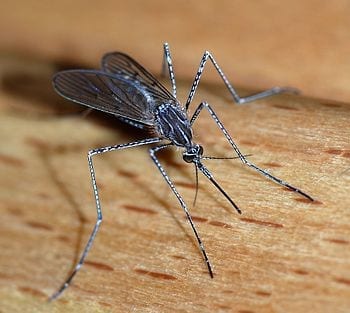
Vectored immunoprophylaxis (VIP) injection triggers creation of antibodies that prevent malaria in 70 percent of mice
A study led by Johns Hopkins Bloomberg School of Public Health researchers found that injecting a vaccine-like compound into mice was effective in protecting them from malaria. The findings suggest a potential new path toward the elusive goal of malaria immunization.
Mice injected with a virus genetically altered to help the rodents create an antibody designed to fight the malaria parasite produced high levels of the anti-malaria antibody. The approach, known as Vector immunoprophylaxis, or VIP, has shown promise in HIV studies. It had never before been tested with malaria, for which no licensed vaccine exists.
A report on the research appears online Aug. 11 in the Proceedings of the National Academy of Sciences (PNAS).
Malaria is one of the world’s deadliest infectious diseases, killing as many as 1 million people per year, the majority of them children in Africa. Malaria patients get the disease from infected mosquitoes. Of the four types of malaria that affect humans, the parasite Plasmodium falciparum is the most lethal, responsible for the majority of malaria cases. Antimalarial treatments and mosquito habitat modification have contributed to a decline in malaria mortality. But the number of cases remains high, and stemming them is a top global health priority.
In their study, researchers used a virus containing genes that were encoded to produce an antibody targeted to inhibit P. falciparum infection. Up to 70 percent of the mice injected with the VIP were protected from malaria-infected mosquito bites. In a subset of mice that produced higher levels of serum antibodies, the protection was 100 percent. The mice were tested a year after receiving a single injection of the virus and were shown to still produce high levels of the protective antibody.
The Latest on: Malaria vaccine
[google_news title=”” keyword=”Malaria vaccine” num_posts=”10″ blurb_length=”0″ show_thumb=”left”]
via Google News
The Latest on: Malaria vaccine
- The fight against malaria remains stagnant, intensifying risks, which is responsible for five-year-olds dying every minuteon April 30, 2024 at 4:15 am
While local transmission rates of malaria remain low, a potential outbreak could endanger nearly 5 million people in regions such as KwaZulu-Natal, Limpopo, and Mpumalanga. Achieving zero risk of ...
- Mozambique: Government to introduce malaria vaccine in Juneon April 30, 2024 at 12:12 am
The Mozambican health minister, Armindo Tiago, has announced that a malaria vaccine will be introduced into the country’s health service in June of this year. According to the minister, who was ...
- Liberia Integrates Rts,S Malaria Vaccine Into Its Expanded Program On Immunizationon April 29, 2024 at 6:10 am
Liberia on Thursday, April 25 achieved a significant milestone in its fight against malaria as it introduces the highly anticipated RTS,S malaria vaccine on World Malaria Day under the theme "Health ...
- R21 anti-malaria vaccine is a game changer: scientist who helped design it reflects on 30 years of research, and what it promiseson April 28, 2024 at 1:00 am
More than 600,000 people die of malaria each year. With low-cost, very effective vaccines being deployed we should be able to get this down to 200,000 or less by the end of this decade then the ...
- India-UK vaccine partnership helps fight malaria in African countrieson April 27, 2024 at 10:20 am
The only two WHO-approved malaria vaccines are developed by UK scientists at GSK and the University of Oxford and are now being manufactured at scale by Indian pharmaceutical companies. The GSK ...
- WHO commends malaria vaccine roll-out in three more African countrieson April 26, 2024 at 3:20 am
Today’s launch brings to eight the number of countries on the continent to offer the malaria vaccine as part of the childhood immunisation programme." ...
- Q&A: Scientist who helped design R21 anti-malaria vaccine reflects on 30 years of research, and what it promiseson April 25, 2024 at 9:17 am
Until three years ago nobody had developed a vaccine against any parasitic disease. Now there are two against malaria: the RTS,S and the R21 vaccines.
- Vaccines are a glimmer of hope against malaria, but the battle has only just begunon April 25, 2024 at 6:10 am
By the time you reach the end of this article, three children will have died from malaria – a disease that casts a dark shadow over nearly half of the world’s population, claiming victims ...
- Malaria is still killing people in Kenya, but a vaccine and local drug production may helpon April 25, 2024 at 12:17 am
Malaria is still a significant public health challenge in Kenya, but an important pilot of the world’s first malaria vaccine may help.
- Two new malaria vaccines are being rolled out across Africa: How they work and what they promiseon April 23, 2024 at 11:40 am
Malaria incidents are on the rise. There were 249 million cases of this parasitic disease in 2022, 5 million more than in 2021. Africa suffers more than any other region from malaria, with 94% of ...
via Bing News










